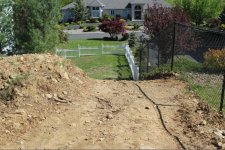1. Hoses are of little concern. Why? Because if you route the hoses correctly, you will never catch them on anything. If you bury your tractor up to it's frame, and manage to somehow tear out one of the hoses for the AWD, you are the only thing at fault, not the tractor. The chances of damaging a hose on an X748 are very remote. John Deere did a good job of tucking them away up top except for where they must come down to the fittings on the front end, but since this is directly behind the axle assembly, it would guard the hoses against a hit anyways. Dry rot? Yea, maybe in 10 YEARS you will have to spend $150 on hoses. Hydraulic motors and valves are a simple fix. If it starts to leak, remove the cover plate and replace the gasket. If your mechanical, there is nothing to an hydraulic motor or valve. These parts are constantly being lubricated, like I said before, so the chance of failure is actually pretty remote. All of your statements are, this CAN happen, or that CAN happen, these are not things that happen to many X748 owners, if any at all. Everything has a danger and a downfall, I am not saying hydraulic drive is perfect, but it IS superior in terms of simplicity and performance. Mechanical 4WD has twice the parts of a Hydraulic AWD system, you cannot argue that.
Heat? We're talking about a garden tractor here. I referenced construction equipment for it's good example of hydraulic power. You are no longer comparing apples to apples. Excavators cycle hundreds of times per minute, with constant hydraulic changes in every cylinder. These are GARDEN TRACTORS. No X748 is going to build up an extreme oil temperature that will destroy the hydraulic system. You would break the machine long before you could destroy the hydrostatic system from heat damage. As long as your running the tractor at full throttle all the time like you should be, you have nothing to worry about.
2. Electric is more efficient than a mechanical drive-train, again, there is absolutely no arguing this point. Locomotives are powered the way they are for many more reasons than simply "starting the load" Dynamic breaking for example. Without it, we would have train wrecks all over the place. It is only possible to create dynamic breaking with an electrical field of energy, which is produced by the generator. When starting out with a train, your tractive effort will be pinned over almost to the red, in notch 8. Let's say you get up to speed of 65, 70 MPH on a main line, and you need notch 8 to maintain speed at that point. Even though your in run 8, same as when you started, your tractive effort will be much much less. The engine RPM is the same, but your not using all of your electrical power at your disposal. With a mechanical system, the engine would lug down like a vehicle in a low gear pulling a hill. Trains could never work unless they work exactly the way they do now. Electric motors can constantly vary there power output, without a need in engine RPM change or a gear change like in a transmission.
3. I never said all vehicles should be HYBRIDS, YOU said that. I SAID, and listen closely now, every vehicle should have a DIESEL ENGINE, HOOKED TO A GENERATOR, THAT THAN SENDS POWER TO ELECTRIC WHEEL MOTORS, AT EACH WHEEL, VIA LARGE COPPER CABLES. NOWHERE did I mention vehicles should have battery banks. Hybrids are a complete sham. Not only are they not as good on fuel as a diesel engine, but people forget how much it took to mine the material needed to make all those batteries, and than produce them. That requires huge earth moving equipment, using millions of gallons of diesel, to extract the lithium needed for your "oh so fuel efficient hybrid" In the end, you caused more harm to the world than a fossil fueled engine alone.
Slap a generator behind that diesel engine in that Jetta, and have an electric wheel motor at each wheel, and you will see more MPG instantly, I guarantee it. We are talking a short distance the power has to travel, and a small amount of power to boot. Any loss in such a small system, with such a short amount of cabling, would be negligible. You could use the wasted heat from the generator to heat the vehicle even, eliminating the need for a heater core under your dash that will one day fail and spew anti-freeze all over the floorboards inside your car. With brushless technology, which has been around for YEARS, a car like I described could be faster than the fastest mechanical drivetrain car out there today, even the million dollar cars. Brushless electric motors create insane amounts of torque, instantly, and they always do. They have no sweet spot, they have no need to be in a certain RPM range to make there best power. They make maximum power, 100% of the time if you want it. Oh yea, brushless motors are virtually maintenance free as well. A little lubrication every now and again, and that's it.
AGAIN, this is NOT what a hybrid is. A Hybrid is a Hybrid, I am talking about a Diesel-Electric powered car, not with electric batteries, with a generator that sends power straight to the wheels, not to a battery bank. There would never be a time that diesel engine is not running if the car is moving or being used, but as soon as you step on the pedal, the power at each wheel motor is what moves the machine, not batteries.


